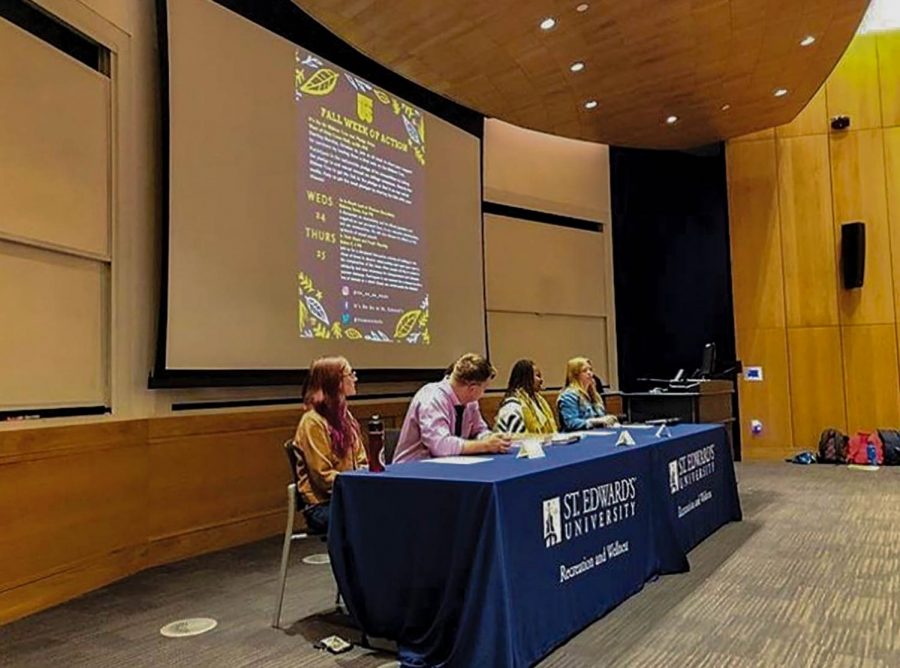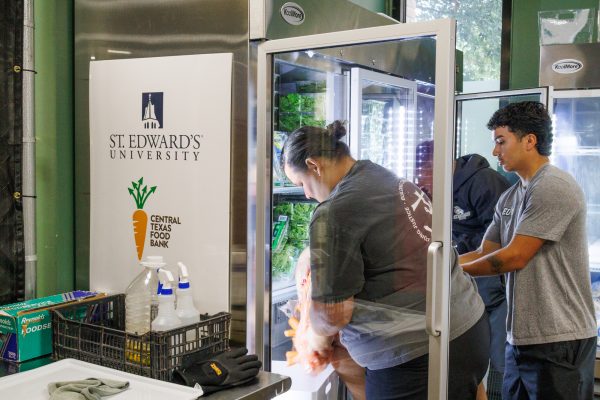It’s On Us hosts Trauma and Healing Panel for mental health awareness
It’s On Us is hosting a series of events this week for survivors of sexual assault.
Heavy workloads and exams are a recipe for an undoubtedly hard time of the year for many college students. For survivors of sexual assault, this could open doors for added stressors in their healing process. Due to recent events, the St. Edward’s University It’s On Us team decided to host a Trauma and Healing Panel discussion as a calming start to their Fall Week of Action.
Students, professors and individuals of the Texas Association Against Sexual Assault joined the panel to talk about the aspects of trauma and how to regard it in everyday life. Dr. McCormick lead the topic with an informative run-down of the way in which trauma works. Contextually, this was necessary for those who weren’t aware of the neurological specifics of trauma and how they correlate with an individual’s healing.
“Some of the choices, some of their behaviors and things that we see survivors exhibit are really just resourceful ways to protect themselves in the aftermath of the trauma,” McCormick explained.
Often, discussions of trauma bring with them major misconceptions. The panel addressed the harmful nature of myths around which society structures their treatment of survivors and informed the audience about how realistic depictions of trauma actually are in the media.
Sophomore student speaker Tyler Holtz shared a personal perspective about the perpetual idea that healing is linear and applicable to all in the same manners.
“It affects everyone so differently, so many people handle it in different ways. You can cry, you can laugh, you can freeze,” Holtz said. “I think it’s important to note not everyone’s trauma is channeled in the same way emotionally.”
The heavier sides of the topic at hand were acknowledged during the question and answer portion of the discussion. The panel read off of pieces of paper that were handed out to the audience at the start, providing a completely anonymous resource for any questions the audience wanted answered. Many of them regarded issues relating to family and friends and the appropriate approach to healing.
“Discussing it as a collective and moving forward,” was suggested by guest speaker Amanda Lewis when the panel was questioned about sharing one important one way in which progress can be seen out of any traumatic situation. It is the act of survivors putting themselves first while learning to heal through community resources.
An overarching theme of the discussion was that every survivor has different forms of healing and what works for one individual might not work for another. Each panelist had a different take on the ways to make progress in healing from a traumatic event. Several outlined the importance of acknowledging change over time: relationships shift and it’s okay to take as much time as is needed to readjust. Others mentioned community alternatives, such as attending counseling and group therapy meetings. And of course, the impact self-care can have; whether that means doing breathing exercises or working out every day.
Complete healing is ultimately ideal, but not only did this panel let its audience know that it might not be immediately possible, it also let them know that they are not alone in the process of getting there.











